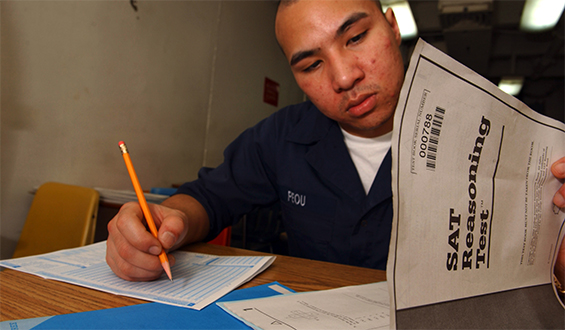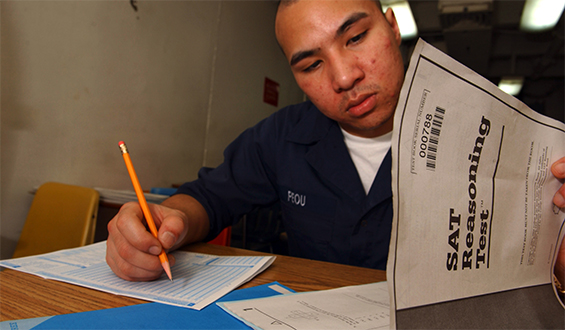 (Photo: Jason T. Poplin, Creative Commons)
(Photo: Jason T. Poplin, Creative Commons)
Internal documents show that not only has the college entrance exam SAT been compromised in Asia, but also that the newly designed test has kept a key vulnerability in place that has been exploited by the test-prep industry for years.
A sophomore at the University of California, Los Angeles, Xingyuan Ding said he took the SAT four times. The final time he took the course he had extra help in the form of a booklet that had been put together by a test-preparation school in Shanghai that he had attended.
Ding said the book, known as jijing in Chinese, is essentially an answer key, offering much more information than the practice questions used by American students. The booklet offers answers to the same multiple choice questions that had appeared on past SAT’s and would be used again on the exam taken by Ding. He said that because of the booklet, he knew the answers to almost half of the critical reading questions, which helped him score a perfect 800 on that section.
The test-preparation school Ding attended is part of an Asian industry that systematically makes use of the shortcomings of the SAT exam. High on that list is a vulnerability created by the College Board, which is the practice of reusing material from previous tests.
This problem has been acknowledged by the College Board, the not-for-profit organization that owns the SAT, who said test security has been a problem within Asia in recent years. As of October 2014, the release of test scores were delayed in Asia six separate times and exams were cancelled in two locations. The College Board said these steps are taken when there is evidence that the test material has been leaked.
However, an investigation performed by Reuters has found an even deeper problem. Renee Dudley reports that since 2013, eight occasions were found in which test material circulated online before the administration of the exam overseas.
According to a confidential PowerPoint presentation, there have been continuous security problems documented by the College Board since June 2013. The presentation shows half of the SAT at that time had been “compromised,” a term used by the organization for any exam that has had its contents leaked, as a whole or just in part. Four exams had been compromised by an unnamed “Chinese website.”
Despite this, officials for the College Board reported that some portions of the compromised material were then used in later versions of the exam that were administered overseas. In addition, no steps have been taken to restrict testing in China despite heightened test security elsewhere that were found to have had exams leaked.
In the 2013-14 school year alone, close to 64,000 students took the SAT in East Asia. In total, 29,000 of those students were from China. There are currently close to 125,000 mainland Chinese graduates now studying at universities in the United States.
Due to the massive number of security breaches that have been uncovered, there is no way to know which of those students were privy to SAT material prior to taking the exam. However, Steve Syverson, an administrator at the University of Washington Bothell and a former board member of the National Association for College Admission Counseling, said that the discovery places a huge amount of distrust on international test scores. “The College Board does a lot of good things, but it will clearly be a major challenge for them to restore trust in the integrity of the test.”
The College Board has responded by renewing its commitment to test security:
We will continue to work with our members to expand educational opportunities for students everywhere in the world while doing all that we can to protect those students from the bad actors who lie, cheat, and steal for personal gain.




